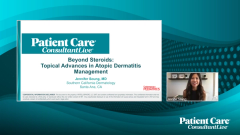
Spotting the Signs: Recognizing Atopic Dermatitis in Practice
An expert discusses advancements in the management of atopic dermatitis, emphasizing early recognition, updated nonsteroidal treatments, accurate differential diagnosis, and the importance of collaboration between dermatology and primary care providers to improve patient outcomes.
Episodes in this series

The presentation explores advancements in the management of atopic dermatitis, emphasizing the need for updated approaches beyond traditional topical steroids. Atopic dermatitis, also known as eczema, presents diagnostic challenges due to its varied appearance across skin tones and ages. The speaker underscores the importance of recognizing early signs and symptoms to ensure timely diagnosis and effective management. She highlights how eczema typically appears as red, itchy, dry, inflamed skin on areas such as the face, neck, arms, and legs. Although it is often diagnosed in childhood, eczema can develop later in life, especially in individuals with sensitive skin or genetic predispositions, triggered by environmental factors or irritants.
The discussion focuses heavily on new developments in topical therapies, especially nonsteroidal treatments. Developing effective topicals that act only on the skin without systemic absorption is complex, yet recent innovations are reshaping treatment options. These new agents offer alternatives for patients and providers concerned with the adverse effects of prolonged steroid use. The presenter shares her clinical experience and emphasizes the importance of integrating these newer treatments into routine primary care practices, enhancing accessibility and broadening treatment strategies for atopic dermatitis.
Finally, the presentation outlines the importance of differential diagnosis, as several other conditions can mimic or coexist with atopic dermatitis. These include psoriasis, tinea, contact dermatitis, seborrheic dermatitis, scabies, and pityriasis rosea. Understanding the distinctions—such as lesion location, morphology, and patient history—is key to avoiding misdiagnosis. Collaboration between dermatologists and primary care providers is vital for optimal patient outcomes, as misidentification or partial treatment can complicate the condition. The speaker encourages a collaborative, informed approach and stresses gentle skin care as an essential preventive measure.
Newsletter
Access practical, evidence-based guidance to support better care for our youngest patients. Join our email list for the latest clinical updates.




